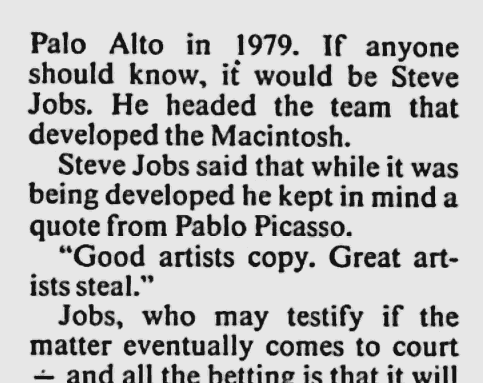Good artists copy, great artists steal.
You have already read or heard this quote, and like many persons around me you attribute it to Picasso?
Or it means to you that one can unashamedly copy because nowadays “everything is a remix”?
What is it about exactly?
It is an apocryphal quote that has gone through several variations.
Its oldest origin seems to have been written by W. H. Davenport Adams in the 19th century:
Great poets imitate and improve, whereas small ones steal and spoil.
Note that the modern variant reverses the words imitate and steal, but the meaning remains the same.
Did Picasso even pronounce this sentence? No reliable source seems to prove it. It is sometimes also attributed to Igor Stravinsky or even William Faulkner. Is it borrowed from T.S. Eliot, who wrote in 1920 “Immature poets imitate, mature poets steal”?
This quote was in fact butchered, the Eliot's complete sentence was “Immature poets imitate; mature poets steal; bad poets deface what they take, and good poets make it into something better, or at least something different”, which you will admit is a lot less catchy.
Some even attributed it to Steve Jobs! While he is definitely not its author, he contributed to popularise the variation so common today. It can be found in a Sidney Morning Herald’s article from 1988, about the Macintosh.
Steve Jobs said that while it was being developed he kept in mind a quote from Pablo Picasso. “Good artists copy, great artists steal.”

Whatever the true origin of this quote, the authors –real or alleged– conveyed the same message: copying and barely changing is frowned upon, but creating something greater from a source of inspiration is celebrated. They recognise that every great creation is only achievable by “standing on the shoulders of giants” —another apocryphal quote often attributed to Isaac Newton— and by learning from our predecessors. Not rejecting tradition, but enrich it.
Picasso and Braque for instance both borrowed from Cézanne’s works, from which they explored then laid the foundations for cubism.
It is also how Jobs meant it, his point of view being that Apple often took inspiration in previous works or products, but reinvented them, integrated them with others idea and took them further. On the other hand he nursed a sheer hatred toward competitors he thought merely copied his products, and sued them.